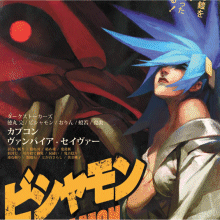
Since having studied Japanese at university for a little under a year now, my proficiency with the language has developed somewhat. Rather thankfully, considering my interests, it has developed to the extent of me being able to blunder and stumble my way through Japanese language games more successfully. Obviously a great deal of the nuance is lost on me, but the fact I can work out what I'm doing without just assuming or consulting some kind of guide is a rather rewarding experience.
Now, while I've been steadily working my way through Chrono Trigger these past few weeks, I also picked up 7th Dragon, after it became part of a value range. I became interested in the game almost as soon as I'd heard of it. As you may have worked out from a few posts on here, I'm a solid fan of Etrian Odyssey, and some time after the second game came out, 7th Dragon appeared, with a some of the key team members behind it. The main difference that struck me was that the character designer was different, acceptably so. But the real hook for me was that Rieko Kodama was a part of the project, who was involved with a handful of favourites of mine. Most notably, Skies of Arcadia, which is often in steady contention with Chrono Trigger as my favourite RPG.
Plotwise, the events are a bit beyond me at this point, but as for the game itself, I'm very satisfied. The best way to describe it is as if they've taken the core mechanics of Etrian Odyssey and made it more of a JRPG, similar to the early Dragon Quest and Final Fantasy games. The concept of creating a guild and creating all of your party still exists, as does taking quests and developing every skill and ability of your party, but it now takes place with an overworld, towns, dungeons and a top down camera view.
Presentation wise, 7th Dragon is quite easily more impressive than Etrian Odyssey, which I can only assume is due to the budget available for a Sega game as opposed to an Atlus one. While in both games you were able to choose a class and appearance for each of your characters, 7th Dragon has overworld and battle sprites for each and every one, whereas Etrian just had a portrait. I can quite happily accept that that is part of Etrian's appeal, to provide a solid, no frills RPG, and it's perhaps a tad unfair to compare the two so directly, but it's hard not to be swayed by 7th Dragon's abundance of sprites dashing, gesturing and leaping across the screen as the battles play out.
I remember that before Etrian Odyssey 3 was revealed, I was concerned that 7th Dragon had marked the death of the series, as if the team had moved on to create a spiritual successor of sorts. Thankfully, that wasn't the case. Despite that though, now that Etrian looks like it'll continue for some time still, 7th Dragon seems to have been a one off, with no release outside of Japan having been mentioned and, to my limited knowledge, no word of a sequel yet. It's a shame too, as while I'm in the early stages still, it seems as if it's going to be something I'll enjoy.



